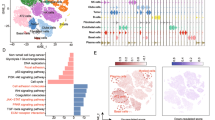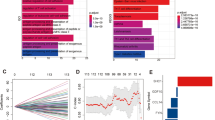Abstract
Background
The role of different subtypes of immune cells is still a matter of debate.
Methods
We compared the prognostic relevance for metastasis-free survival (MFS) of a B-cell signature (BS), a T-cell signature (TS), and an immune checkpoint signature (CPS) in node-negative breast cancer (BC) using mRNA expression. Microarray-based gene-expression data were analyzed in six previously published cohorts of node-negative breast cancer patients not treated with adjuvant therapy (n = 824). The prognostic relevance of the individual immune markers was assessed using univariate analysis. The amount of independent prognostic information provided by each immune signature was then compared using a likelihood ratio statistic in the whole cohort as well as in different molecular subtypes.
Results
Univariate Cox regression in the whole cohort revealed prognostic significance of CD4 (HR 0.66, CI 0.50–0.87, p = 0.004), CXCL13 (HR 0.86, CI 0.81–0.92, p < 0.001), CD20 (HR 0.76, CI 0.64–0.89, p = 0.001), IgκC (HR 0.81, CI 0.75–0.88, p < 0.001), and CTLA-4 (HR 0.67, CI 0.46–0.97, p = 0.032). Multivariate analyses of the immune signatures showed that both TS (p < 0.001) and BS (p < 0.001) showed a significant prognostic information in the whole cohort. After accounting for clinical-pathological variables, TS (p < 0.001), BS (p < 0.05), and CPS (p < 0.05) had an independent effect for MFS. In subgroup analyses, the prognostic effect of immune cells was most pronounced in HER2+ BC: BS as well as TS showed a strong association with MFS when included first in the model (p < 0.001).
Conclusion
Immune signatures provide subtype-specific additional prognostic information over clinical-pathological variables in node-negative breast cancer.


Similar content being viewed by others
References
Schumacher T, Schreiber RD (2015) Neoantigens in cancer immunotherapy. Science 348(6230):69–74
Denkert C et al (2010) Tumor-associated lymphocytes as an independent predictor of response to neoadjuvant chemotherapy in breast cancer. J Clin Oncol 28(1):105–113
Salgado R et al (2015) The evaluation of tumor-infiltrating lymphocytes (TILs) in breast cancer: recommendations by an International TILs Working Group 2014. Ann Oncol 26(2):259–271
Iglesia MD et al (2016) Genomic analysis of immune cell infiltrates across 11 tumor types. J Natl Cancer Inst 108(11):144
Rody A et al (2009) T-cell metagene predicts a favorable prognosis in estrogen receptor-negative and HER2-positive breast cancers. Breast Cancer Res 11(2):R15
Mahmoud SM et al (2011) Tumor-infiltrating CD8+ lymphocytes predict clinical outcome in breast cancer. J Clin Oncol 29(15):1949–1955
Varn FS et al (2016) Adaptive immunity programmes in breast cancer. Immunology 150(1):25–34
Chung YR et al (2017) Prognostic value of tumor infiltrating lymphocyte subsets in breast cancer depends on hormone receptor status. Breast Cancer Res Treat 161(3):409–420
Gu-Trantien C et al (2013) CD4(+) follicular helper T cell infiltration predicts breast cancer survival. J Clin Investig 123(7):2873–2892
Fremd C et al (2013) B cell-regulated immune responses in tumor models and cancer patients. Oncoimmunology 2(7):e25443
Olkhanud PB et al (2011) Tumor-evoked regulatory B cells promote breast cancer metastasis by converting resting CD4(+) T cells to T-regulatory cells. Cancer Res 71(10):3505–3515
Mahmoud SM et al (2012) The prognostic significance of B lymphocytes in invasive carcinoma of the breast. Breast Cancer Res Treat 132(2):545–553
Schmidt M et al (2008) The humoral immune system has a key prognostic impact in node-negative breast cancer. Cancer Res 68(13):5405–5413
Schmidt M et al (2012) A comprehensive analysis of human gene expression profiles identifies stromal immunoglobulin kappa C as a compatible prognostic marker in human solid tumors. Clin Cancer Res 18(9):2695–2703
Heimes AS (2017) Prognostic significance of IRF4 in node-negative breast cancer. J Cancer Res Clin Oncol. doi:10.1007/s00432-017-2377-7
Schalper KA et al (2014) In situ tumor PD-L1 mRNA expression is associated with increased TILs and better outcome in breast carcinomas. Clin Cancer Res 20(10):2773–2782
Yu H et al (2015) Cytotoxic T lymphocyte antigen 4 expression in human breast cancer: implications for prognosis. Cancer Immunol Immunother 64(7):853–860
Mazel M et al (2015) Frequent expression of PD-L1 on circulating breast cancer cells. Mol Oncol 9(9):1773–1782
Whiteside TL, Ferrone S (2012) For breast cancer prognosis, immunoglobulin kappa chain surfaces to the top. Clin Cancer Res 18(9):2417–2419
Schmidt M et al (2011) Ep-CAM RNA expression predicts metastasis-free survival in three cohorts of untreated node-negative breast cancer. Breast Cancer Res Treat 125(3):647–650
McCall MN, Bolstad BM, Irizarry RA (2010) Frozen robust multiarray analysis (fRMA). Biostatistics 11(2):242–253
R Core Team (2016) R: a language and environment for statistical computing. R Foundation for Statistical Computing, Vienna
Therneau T (2015) A package for survival analysis in S, R package version 2.38. http://CRAN.R-project.org/package=survival
Prat A et al (2012) PAM50 assay and the three-gene model for identifying the major and clinically relevant molecular subtypes of breast cancer. Breast Cancer Res Treat 135(1):301–306
Siggelkow W et al (2012) Expression of aurora kinase A is associated with metastasis-free survival in node-negative breast cancer patients. BMC Cancer 12:562
Burugu S, Asleh-Aburaya K, Nielsen TO (2017) Immune infiltrates in the breast cancer microenvironment: detection, characterization and clinical implication. Breast Cancer 24(1):3–15
Gentles AJ et al (2015) The prognostic landscape of genes and infiltrating immune cells across human cancers. Nat Med 21(8):938
Denkert C et al (2015) Tumor-infiltrating lymphocytes and response to neoadjuvant chemotherapy with or without carboplatin in human epidermal growth factor receptor 2-positive and triple-negative primary breast cancers. J Clin Oncol 33(9):983–991
Funding
No funding was received.
Author information
Authors and Affiliations
Corresponding author
Ethics declarations
Competing interest
The authors have no conflict of interest.
Ethics approval
The study was approved by the Research Ethics Committee of the University Medical Centre Mainz, Germany. Informed consent was obtained from all patients and all clinical investigations were conducted according to the ethical and legal standards.
Electronic supplementary material
Below is the link to the electronic supplementary material.
Rights and permissions
About this article
Cite this article
Heimes, AS., Madjar, K., Edlund, K. et al. Subtype-specific prognostic impact of different immune signatures in node-negative breast cancer. Breast Cancer Res Treat 165, 293–300 (2017). https://doi.org/10.1007/s10549-017-4327-0
Received:
Accepted:
Published:
Issue Date:
DOI: https://doi.org/10.1007/s10549-017-4327-0




